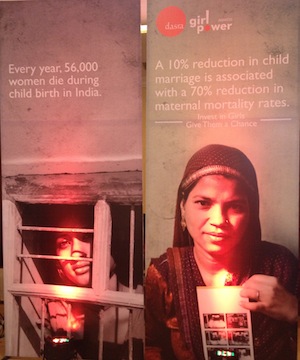Dasra Philanthropy Week 2014: Urgency in gender equality
Leading India’s philanthropy sector forward with clear direction and ever-increasing energy, Dasra hosted its fifth annual Dasra Philanthropy Week March 5-7. Over the years, it’s grown into a powerful initiative convening more than 600 prominent philanthropists (including, this year, Jennifer and Warren Buffet via webcast, and Nadir Godrej), corporations and impact investors to catalyze funding to India’s social sector. According to Dasra, the event has catalyzed INR 172 crore ($27.8 million) in funding and increased media mentions of philanthropy by 44 percent in the months following the forum.
A notable and strategic shift in Dasra’s strategy is its central focus on adolescent girl empowerment, with a five-year, $14 million initiative in collaboration with USAID, Kiawah Trust and the Piramal Foundation. The shared goal is to achieve systemic change in several girl-related issues including child marriage, domestic violence, menstrual hygiene and nutrition.
According to Lynne Smitham, co-founder of Kiawah Trust, “Work around adolescent girls in India has typically been isolated and scattered and there has been little or no collaboration among stakeholders. The Dasra Alliance aims to alter this approach and build a collaborative ecosystem in order to foster, drive and deliver knowledge, innovation, funding and achieve impact at scale.”

Toward this end, Dasra is quickly producing much-needed research on more themes affecting adolescent girls, announcing the launch of their Domestic Violence Report – No Private Matter. Dasra also announced the winners of its newly launched Girl Power Awards, in collaboration with DSP Blackrock mutual fund, which awarded grants of INR 10 lakh ($16,194) each to three high-impact organizations empowering adolescent girls. Chosen from a pool of almost 200 applications, the winners were:
• Centre for Unfolding Learning Potentials, which provides bridge courses for 700 out-of-school girls in the state of Rajasthan;
• Ashish Gram Rachna Trust (Institute of Health Management, Pachod), which has successfully shown interventions to delay the age at first conception for adolescent girls;
• Vacha, which has impacted 8,000 adolescent girls who face social discrimination, providing safe spaces with education and community support, and creating community leaders.
Perhaps it’s time for the next breed of Indian social entrepreneurs to take the cue and focus on the levers that make a big difference to poverty alleviation – namely, empowering adolescent girls.
Nilima Achwal currently leads the SEED program at Villgro Innovations Foundation, an India-based social enterprise incubator that provides seed funding and mentoring to social enterprises that have the potential to scale up and transform rural India.
- Categories
- Impact Assessment, Social Enterprise
